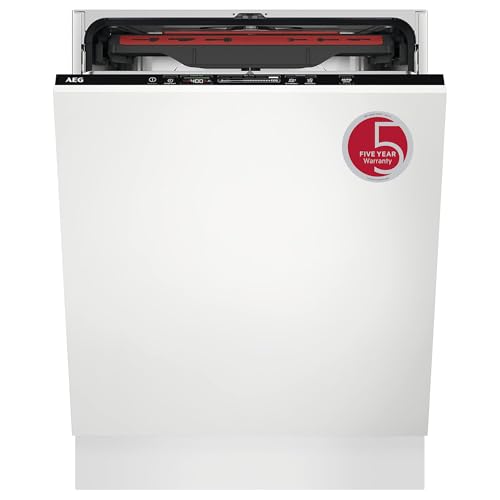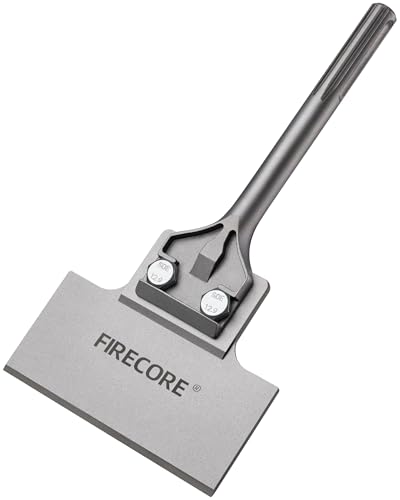




Quartz countertops have gained popularity in recent years due to their durability, low maintenance, and aesthetic appeal. However, many people are unsure about the best way to clean and disinfect their quartz surfaces, especially when it comes to using bleach. While bleach is known for its powerful disinfecting properties, it is important to understand the potential risks and recommended guidelines for using bleach on quartz.
Quartz is a non-porous material, meaning it does not absorb liquids or stains easily. This is one of the reasons why it is a popular choice for kitchen and bathroom countertops. However, using bleach on quartz can still have negative effects if not done correctly. Bleach contains harsh chemicals that can potentially damage the surface of the quartz and cause discoloration.
Experts recommend avoiding the use of bleach on quartz countertops whenever possible. Instead, it is recommended to use non-abrasive, pH-neutral cleaners specifically designed for quartz surfaces. These cleaners are gentle enough to effectively remove dirt, stains, and bacteria from the surface without harming the quartz. Additionally, it is important to always follow the manufacturer’s instructions for cleaning and maintenance to ensure the longevity of your quartz countertops.
In case you do need to disinfect your quartz countertops, experts suggest using a 50/50 mixture of water and isopropyl alcohol as a safer alternative to bleach. This solution can effectively kill bacteria and viruses without causing damage to the quartz surface.
When it comes to maintaining the beauty and integrity of your quartz countertops, it is always best to err on the side of caution. Avoiding the use of bleach and opting for safer cleaning alternatives will help preserve the longevity and appearance of your quartz surfaces for years to come.
Is Bleach Safe to Use on Quartz Countertops?
When it comes to cleaning quartz countertops, there is often confusion as to whether bleach can be safely used. Bleach is a powerful disinfectant and stain remover, but it can potentially cause damage to quartz if used improperly.
Quartz is a popular choice for countertops due to its durability and low maintenance. However, it is still important to take precautions when cleaning and disinfecting quartz surfaces to protect their longevity and appearance.
Advantages of Using Bleach on Quartz Countertops
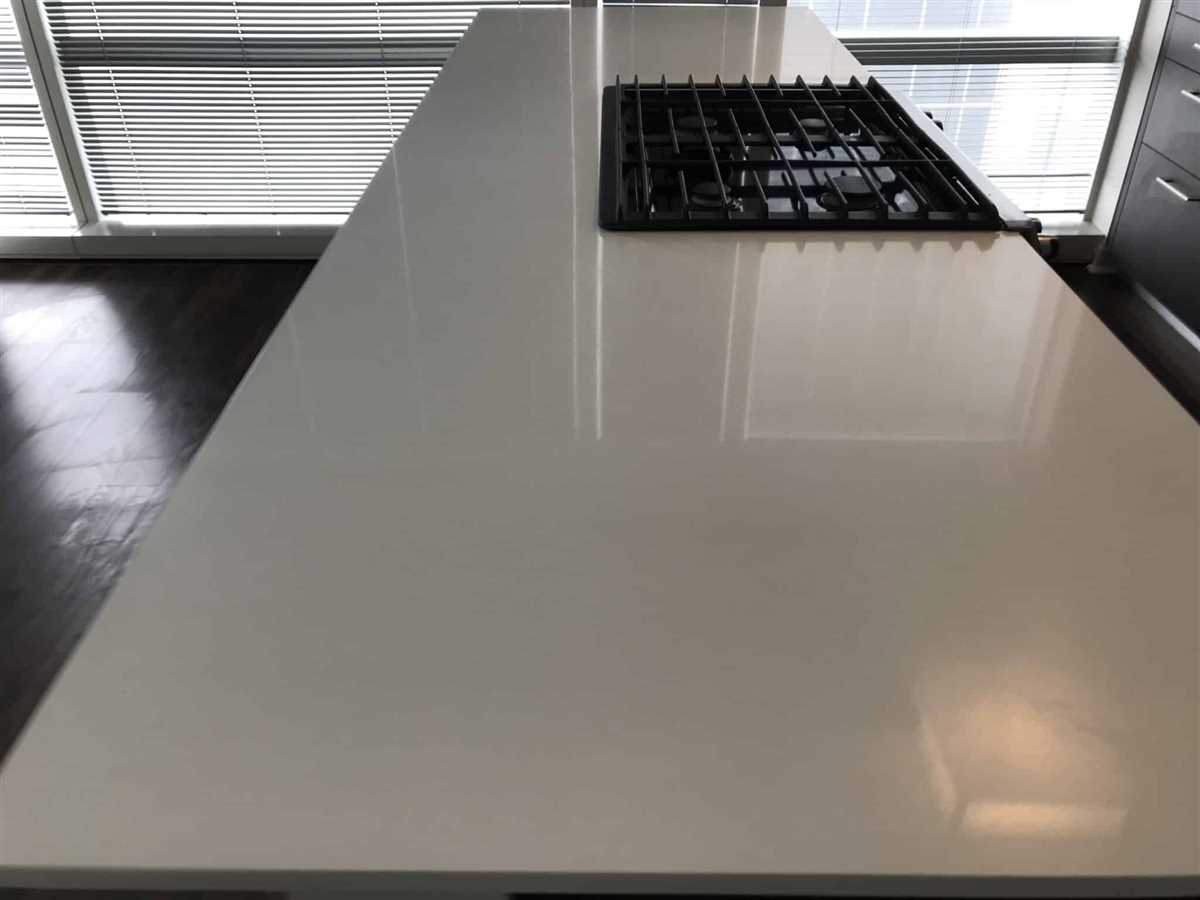
- Disinfection: Bleach is highly effective at killing bacteria, viruses, and other germs, making it a popular choice for cleaning and disinfecting surfaces.
- Stain removal: Bleach can help remove tough stains, such as those caused by coffee, red wine, or juice.
Precautions when Using Bleach on Quartz Countertops
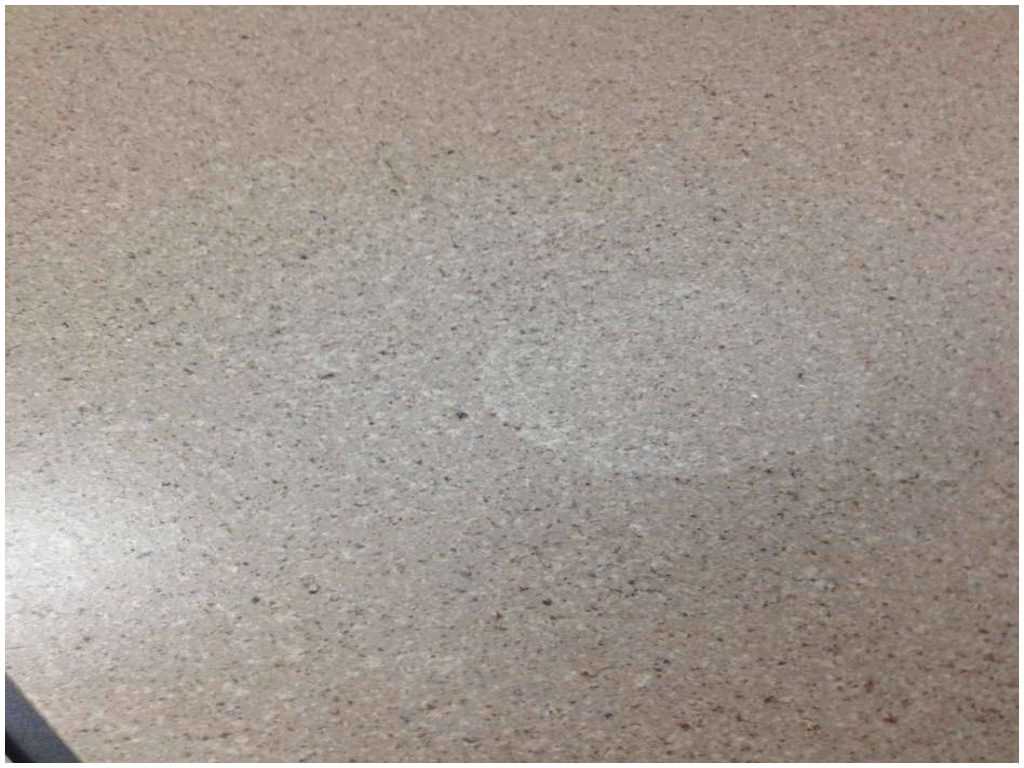
While bleach can be effective for cleaning quartz countertops, it is important to follow these guidelines to minimize the risk of damage:
- Dilute the bleach: It is crucial to dilute the bleach according to the manufacturer’s instructions. Undiluted bleach can be too strong and potentially damage the quartz surface. A recommended ratio is 1 part bleach to 10 parts water.
- Avoid prolonged exposure: Limit the contact time between bleach and the quartz surface to reduce the risk of discoloration or other damage. After applying the diluted bleach, promptly rinse it off with water.
- Avoid abrasive materials: When cleaning quartz countertops, use a soft cloth or sponge to apply the bleach solution. Avoid scrubbing with abrasive materials, as they can cause scratching.
- Test in an inconspicuous area: Before using bleach on the entire quartz countertop, test it in a small, inconspicuous area to ensure that it does not damage or discolor the surface.
- Regular maintenance: To keep quartz countertops in optimal condition, it is important to perform regular cleaning using a mild, non-abrasive cleaner and a soft cloth or sponge.
Overall, while bleach can be used safely on quartz countertops when proper precautions are followed, it is important to be careful and use it sparingly. Always consult the manufacturer’s guidelines and test in an inconspicuous area to ensure the bleach does not damage or affect the appearance of your quartz countertops.
Understanding Quartz and Its Cleaning Needs
Quartz is a popular choice for countertops and other surface applications due to its durability, low maintenance, and aesthetic appeal. However, it is important to understand how to properly clean and care for quartz to ensure its longevity and keep it looking its best.
What is Quartz?
Quartz is a man-made material composed of natural quartz crystals and resin. This combination creates a non-porous surface that is highly resistant to stains, scratches, and heat. Quartz is available in a wide range of colors and finishes, making it a versatile option for both residential and commercial spaces.
Cleaning Quartz
To clean quartz, it is important to avoid using harsh chemicals and abrasive cleaners that can damage the surface and affect its appearance. Instead, opt for a gentle, pH-neutral cleaner that is specifically formulated for quartz surfaces.
- Regularly clean quartz countertops with a mixture of warm water and mild liquid dish soap. Use a soft cloth or non-abrasive sponge to gently scrub the surface. Rinse thoroughly with clean water and dry with a soft cloth.
- For tougher stains or dried-on food particles, you can use a non-abrasive cleaning scrub or a mixture of baking soda and water. Apply the scrub to the stain and gently scrub the area with a soft cloth or sponge. Rinse thoroughly and dry.
- Avoid using bleach or bleach-based cleaners on quartz surfaces, as they can cause discoloration and damage to the surface.
- Do not use abrasive scrub brushes or scouring pads, as they can scratch the surface of the quartz.
Maintaining Quartz
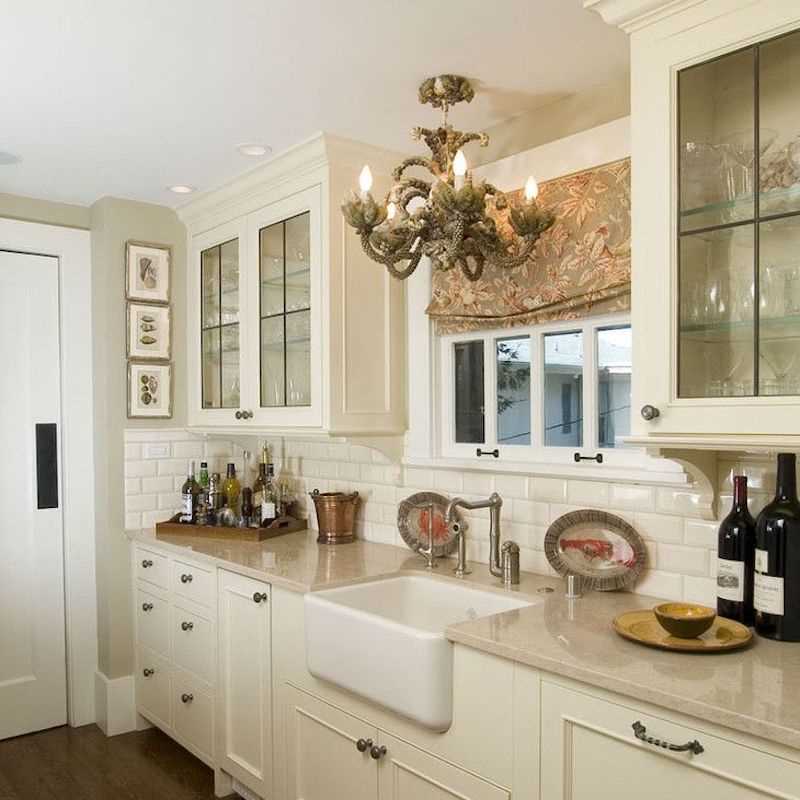
To maintain the beauty and integrity of quartz surfaces, it is important to practice proper care and maintenance. Here are some tips to keep in mind:
- Always use cutting boards or chopping blocks when preparing food on quartz countertops. While quartz is highly resistant to scratches, using a cutting board can help prevent any accidental damage.
- Use trivets or hot pads under hot pots, pans, and other heated objects to protect the quartz surface from extreme temperature changes.
- Avoid placing heavy objects or applying excessive force on quartz surfaces, as this can cause cracks or other damage.
- Regularly clean up spills and stains promptly to prevent them from settling and becoming more difficult to remove.
- Avoid exposing quartz to strong chemicals, such as solvents or paint removers, as they can cause damage to the surface.
By understanding the unique properties of quartz and following the proper cleaning and maintenance techniques, you can keep your quartz surfaces looking beautiful and extend their lifespan.
Expert Advice on Using Bleach on Quartz Surfaces
1. Read the Manufacturer’s Guidelines
Before using bleach on your quartz surfaces, it is crucial to read and follow the manufacturer’s guidelines. Different quartz brands may have specific instructions and recommendations for cleaning and disinfecting.
2. Dilute the Bleach Properly
When using bleach on quartz, it’s essential to dilute it properly to avoid damaging the surface. Follow the instructions on the bleach bottle to ensure the right ratio of bleach to water.
3. Spot Test in a Discreet Area
Before applying bleach to the entire quartz surface, perform a spot test in a discreet area. Apply a small amount of diluted bleach on an inconspicuous spot and wait for a few minutes to see if any discoloration or damage occurs.
4. Avoid Prolonged Exposure
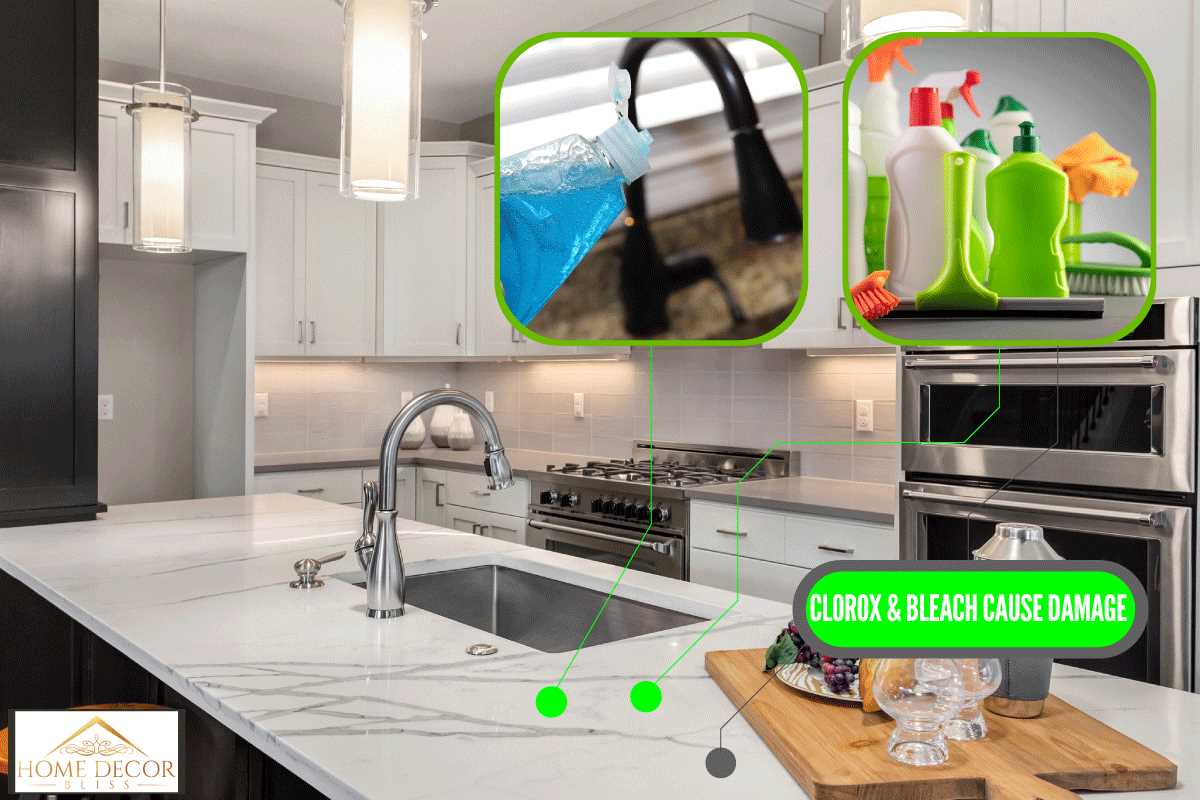
Quartz surfaces are generally resistant to chemicals, but prolonged exposure to bleach can still cause damage. To minimize the risk, avoid leaving bleach on the quartz for an extended period. Rinse the surface thoroughly with water after cleaning.
5. Use a Soft Cloth or Non-Abrasive Sponge
When cleaning quartz with bleach, use a soft cloth or non-abrasive sponge to avoid scratching the surface. Gently scrub the quartz with the bleach solution, ensuring even coverage.
6. Rinse Thoroughly with Water
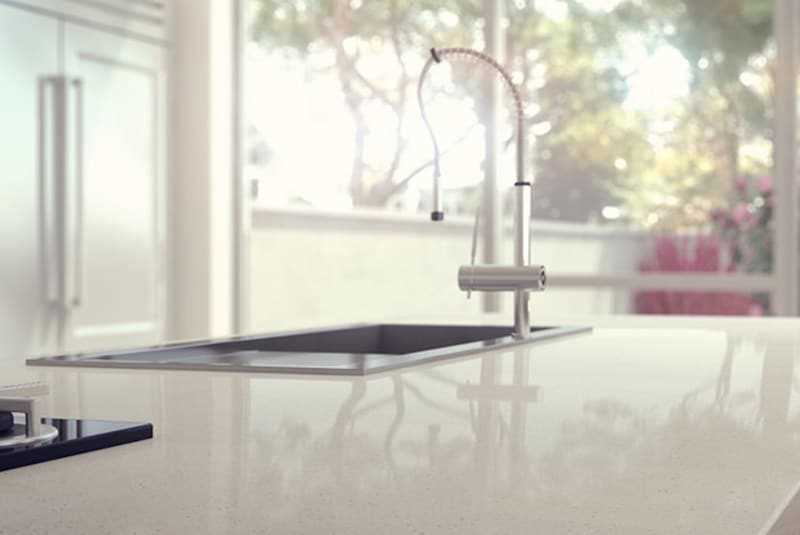
After cleaning with bleach, rinse the quartz surface thoroughly with water to remove any residual bleach. This step is crucial to prevent any potential damage or discoloration caused by leftover bleach.
7. Dry the Surface Completely
Once the quartz surface is rinsed, dry it completely using a clean, soft cloth. This helps prevent water spots and keeps the quartz looking its best.
8. Consider Alternatives to Bleach
If you are concerned about using bleach on your quartz surfaces, consider using alternative cleaning and disinfecting methods. There are several quartz-safe cleaners available on the market that can effectively sanitize your quartz without the use of bleach.
Conclusion
While bleach can be used safely on quartz surfaces, it is essential to follow these expert tips to minimize the risk of damage. Always refer to the manufacturer’s guidelines and perform a spot test before applying bleach to the entire surface. If you have concerns, consider using alternative cleaning methods specifically designed for quartz surfaces.
Potential Risks and Side Effects of Using Bleach on Quartz
While bleach is a commonly used household cleaning product, it is important to understand that it can cause potential risks and side effects when used on quartz surfaces. Here are some considerations to keep in mind:
1. Discoloration:
Using bleach on quartz can lead to discoloration. The chemical composition of bleach can interact with the pigments in the quartz, causing it to lose its original color and appear faded or discolored.
2. Etching:
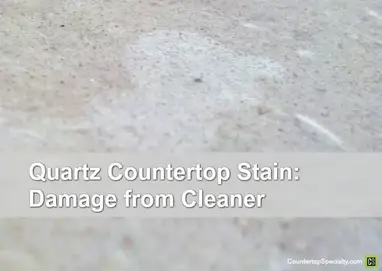
Bleach is a strong and corrosive substance. It can cause etching on the surface of quartz, resulting in dull spots or a loss of shine. Etching occurs when the bleach reacts with the quartz, causing micro-abrasions on the surface.
3. Weakening of the Resin Binders:
Quartz countertops are typically made with a combination of natural quartz crystals and resin binders. Bleach can weaken these resin binders over time, causing the quartz to become more vulnerable to damage and degradation.
4. Health Risks:
Bleach contains harsh chemicals, such as chlorine, that can release toxic fumes when mixed with other cleaning agents or used in poorly ventilated areas. Breathing in these fumes can be harmful to your health and may cause respiratory irritation or other serious health complications.
5. Allergic Reactions:
Some individuals may be sensitive or allergic to the chemicals present in bleach. Direct contact with bleach on quartz surfaces can cause skin irritation, redness, itching, or rashes.
6. Damage to Surrounding Materials:
When bleach is used on quartz, it can inadvertently come into contact with other materials in the surrounding area, such as metal fixtures or wooden cabinets. Bleach can cause damage or corrosion to these materials, leading to costly repairs or replacements.
It is crucial to consider these potential risks before using bleach on quartz surfaces. It is advisable to consult with the manufacturer or a professional cleaner who is experienced in quartz maintenance for recommended cleaning methods and products that are safe for your quartz countertops.
Safe Alternatives to Bleach for Cleaning Quartz
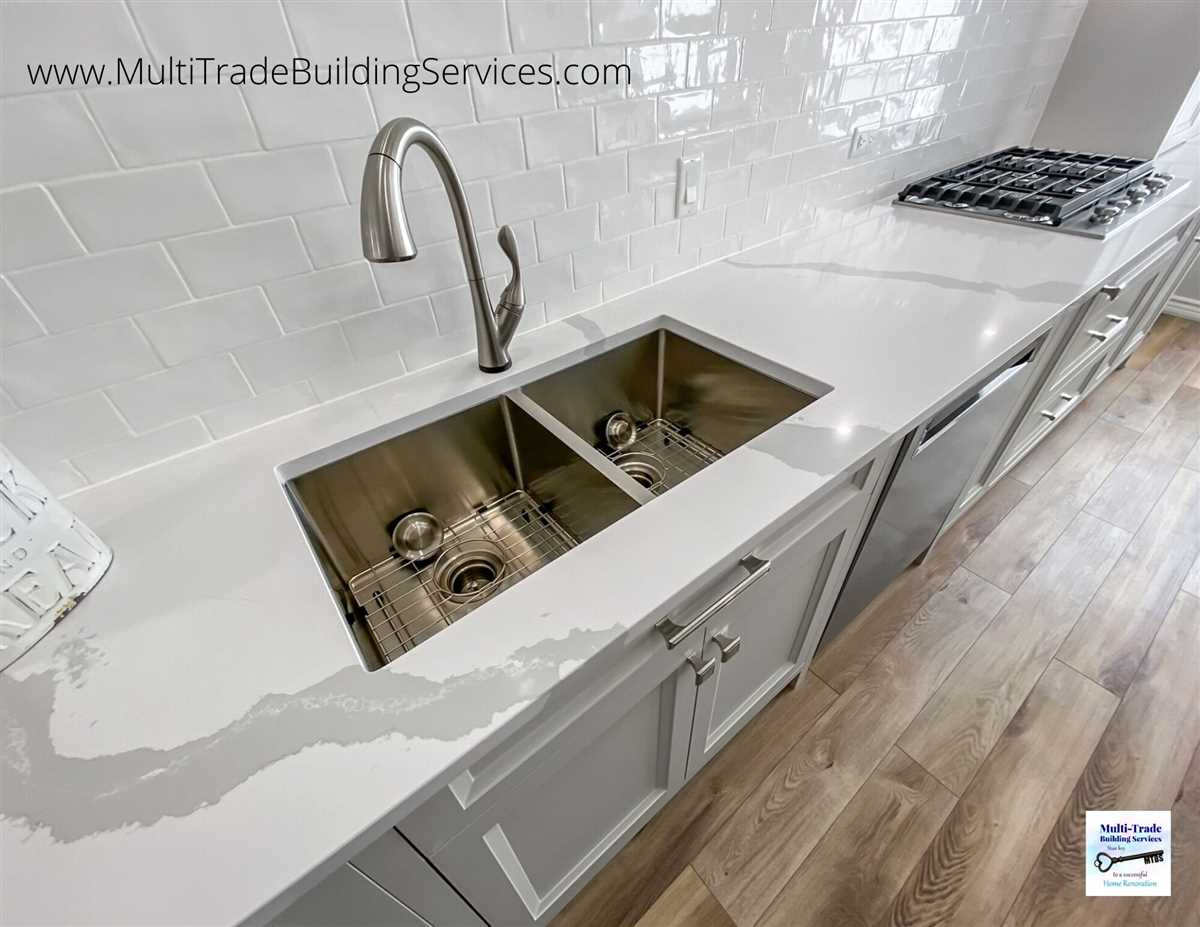
While bleach can be effective for cleaning quartz, it is not always the safest option. Bleach can be harsh on quartz surfaces and may cause discoloration or damage over time. If you are looking for safer alternatives to clean your quartz surfaces, consider the following options:
1. Mild Soap and Water
One of the safest and most effective ways to clean quartz is by using mild soap and water. Mix a small amount of gentle dish soap with warm water and use a soft cloth or sponge to gently clean the surface. Avoid using abrasive materials or scrub brushes that could potentially scratch the quartz.
2. White Vinegar Solution
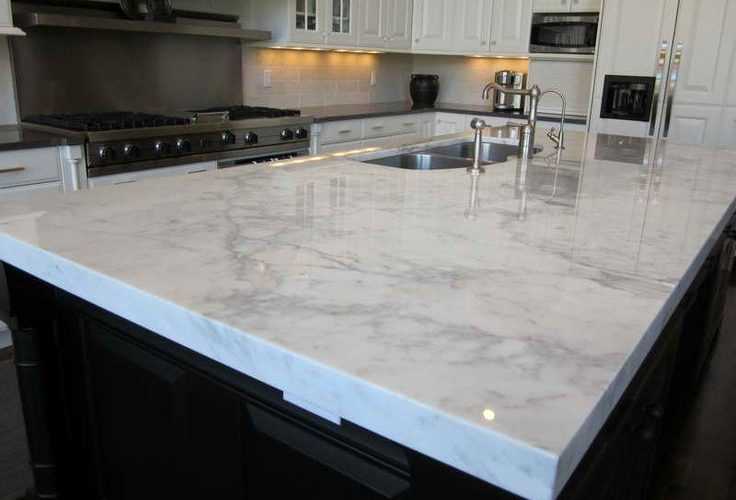
White vinegar is a natural cleaning agent that can be used to safely clean quartz. Mix equal parts white vinegar and water in a spray bottle and spritz the solution onto the quartz surface. Let it sit for a few minutes, then wipe clean with a soft cloth or sponge. Rinse thoroughly with water afterwards to remove any residue.
3. Isopropyl Alcohol
Isopropyl alcohol is another safe alternative for cleaning quartz. Dampen a soft cloth or sponge with isopropyl alcohol and gently wipe the surface. This will help remove any oil, grease, or grime without damaging the quartz. Make sure to rinse with water afterwards and dry the surface thoroughly.
4. Baking Soda Paste
Baking soda is a gentle abrasive that can be used to remove stubborn stains from quartz. To make a baking soda paste, mix baking soda with water until it forms a thick consistency. Apply the paste to the stained area and gently scrub with a soft cloth or sponge. Rinse with water and dry the surface afterwards.
5. Commercial Quartz Cleaners
There are also commercial quartz cleaners available on the market that are specifically formulated for cleaning and maintaining quartz surfaces. These cleaners are designed to be safe and effective for quartz and can be a convenient option if you prefer ready-to-use products.
6. Regular Maintenance
Preventing the need for heavy-duty cleaning by regularly maintaining your quartz surfaces can also help keep them looking their best. Wiping up spills promptly, using cutting boards and trivets, and avoiding abrasive cleaners or tools can all help preserve the beauty of your quartz countertops or surfaces.
Remember to always read the manufacturer’s instructions for cleaning and care of your quartz surfaces, as specific recommendations may vary. Using these safe alternatives can help you keep your quartz looking clean and beautiful without potentially damaging bleach.
FAQ
Can I safely use bleach to clean my quartz countertops?
Yes, you can safely use bleach to clean quartz countertops. However, it is important to properly dilute the bleach and avoid using too much of it. Also, make sure to rinse the countertops thoroughly after cleaning.
What is the recommended method for using bleach on quartz?
The recommended method for using bleach on quartz is to first dilute it with water. Mix one part bleach with four parts water. Apply the diluted bleach to the countertop, let it sit for a few minutes, and then rinse it off with water. This will help avoid any damage to the quartz surface.
Can I use undiluted bleach on my quartz countertops?
No, it is not recommended to use undiluted bleach on quartz countertops. Using undiluted bleach can be too harsh and may cause damage to the quartz surface. It is always best to dilute the bleach with water before using it on quartz.
Is bleach safe to use on all types of quartz countertops?
Bleach is generally safe to use on all types of quartz countertops. However, it is always a good idea to check with the manufacturer or consult the care and maintenance guide for your specific quartz product. Some quartz countertops may have specific cleaning recommendations that you should follow.
Are there any alternatives to using bleach on quartz countertops?
Yes, there are alternatives to using bleach on quartz countertops. You can use a mild soap and water solution to clean the countertops. Another option is to use a non-abrasive household cleaner specifically designed for quartz surfaces. These alternatives can effectively clean the quartz without the potential harshness of bleach.
Can bleach cause any damage to quartz countertops?
If used improperly, bleach can cause some damage to quartz countertops. Using undiluted bleach or leaving bleach on the surface for too long can cause discoloration or etching. It is important to properly dilute the bleach and rinse the countertops thoroughly to avoid any potential damage.
What should I do if I accidentally spill bleach on my quartz countertops?
If you accidentally spill bleach on your quartz countertops, it is important to act quickly. Immediately wipe up the spill with a soft cloth or sponge. Rinse the area with water to ensure that all traces of bleach are removed. If any discoloration or damage occurs, consult a professional for guidance on potential repairs.




